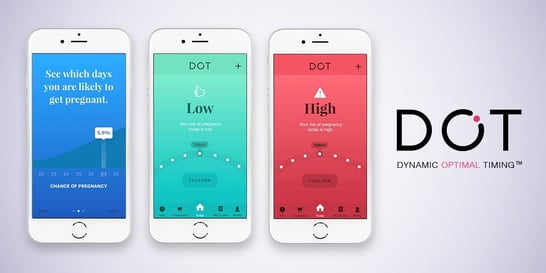 Do you worry about family planning with some of your patients? If so, this article about an “app” that helps to avoid unwanted pregnancies may be helpful. “Dot” is the only family planning app that relies solely on period start dates. Health experts believe an estimated 225 million women worldwide are not using effective family planning methods, but want to avoid pregnancy.
Do you worry about family planning with some of your patients? If so, this article about an “app” that helps to avoid unwanted pregnancies may be helpful. “Dot” is the only family planning app that relies solely on period start dates. Health experts believe an estimated 225 million women worldwide are not using effective family planning methods, but want to avoid pregnancy.
The Dot app will be studied over a year. If used correctly, researchers in an earlier study found the app is almost 100% effective at avoiding an unwanted pregnancy. Continue reading below for more details about the study and more information about the Dot app.
Researchers at Georgetown University Medical Center’s Institute for Reproductive Health (IRH) announced the launch of a year–long study to measure the efficacy of a new app, Dot™, for avoiding unintended pregnancy as compared to efficacy rates of other family planning methods. The Dot app, available on iPhone and Android devices, is owned by Cycle Technologies. Up to 1,200 Dot Android users will have the opportunity to participate in the study.
The study, funded by a grant from U.S. Agency for International Development (USAID), will be the first known study to examine how women use a fertility app in real–time and to evaluate its effectiveness at avoiding unintended pregnancy. In a previous study, a research team found that Dot is theoretically 96 to 98 percent effective at avoiding unintended pregnancy if used correctly. As a woman continues to use it, the app increases its individual accuracy.
While there are thousands of menstrual cycle tracking apps on the market, recent research has demonstrated that the majority are not accurate enough to avoid unintended pregnancy or plan a pregnancy. One study evaluated 100 fertility awareness apps. Only six could correctly identify the fertile window. This finding highlights the importance for app–based family planning tools to rely on scientifically–backed methods and to be evaluated thoroughly for their accuracy.
“Our new study is unique because we’re testing the efficacy of Dot as a method to avoid unplanned pregnancy in a real–time situation,” says Rebecca Simmons, PhD, a senior research officer at IRH.
The study will evaluate Dot’s efficacy in avoiding unplanned pregnancies using a protocol that allows researchers to compare the results to known efficacy rates of other family planning options. It will also explore social factors, such as how Dot affects relationships. The researchers will recruit participants through Dot for Android, issue surveys in the app, and interview participants four times during the study. Participants will receive a gift card each time they enter period start date information and each time they complete a survey.
The IRH study could have global significance because multiple studies suggest that the main reason women stop using the birth control pill is side effects. If Dot can help women avoid pregnancy without the pill’s high abandonment rate, it’s a compelling alternative, says Simmons. The app would be especially useful in the developing world, where there is significant unmet family planning need. Global health experts estimate that 225 million women worldwide are not using effective family planning methods but want to avoid pregnancy.
“Dot users have a historical opportunity to advance the science of birth control and family planning,” said Leslie Heyer, president and founder of Cycle Technologies. “No fertility app has undergone such rigorous testing. Users who join our effort can help make free, effective fertility tools accessible to women throughout the world.”
Cycle Technologies developed the science and algorithm behind Dot™ in collaboration with global health experts from Georgetown University, Duke University and The Ohio State University. Dot is the only family planning app that relies solely on period start dates to determine a user’s individual fertile days.


